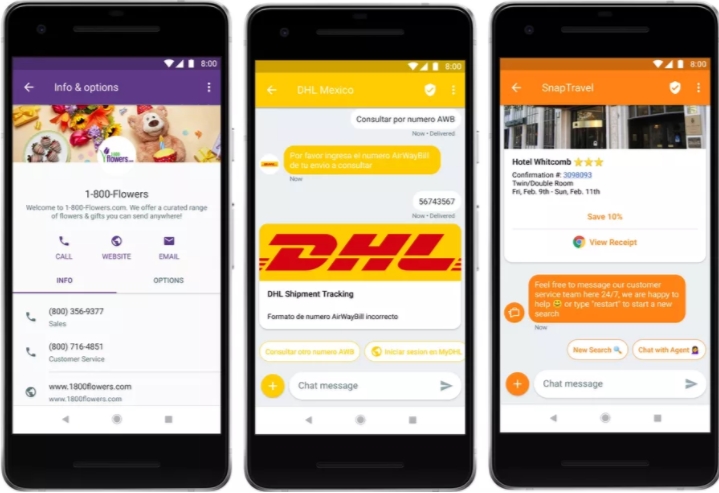
After a year in development, Google is flipping the switch on “RCS business messaging.” Essentially, it means that brands can text more multimedia-rich messages to Android users. The idea is that instead of just getting an SMS from a random five-digit shortcode telling you that your hotel room has been booked, you get something much more useful. Something like a message showing the hotel’s address, a picture of your room, and quick-reply buttons that let you jump right into a chat with somebody in the lobby so you can start hustling for that suite upgrade.
That’s the idea, anyway. But if you’ve been following the long and winding road that is either Google Messaging apps or Rich Communication Services (the RCS mentioned above), you know that ideas about texting on Android and realities rarely meet. The downside here is that only a dozen or so companies are on board after a year of work, including the likes of 1-800-flowers, 1-800-contacts, DHL, Booking.com, and Subway.
Google’s blog post notes specifically that it has “collaborated with Sprint” in the US, the services are coming to Mexico “soon,” and other regions and businesses are meant to follow after that.
So it’s a relatively small rollout, meaning only a small sliver of Android users will have the opportunity to negotiate a footlong from Subway in full RCS richness. For the rest, Google says, RCS for business will fall back to standard SMS. As for privacy, well, the not-so-great news is that Google says RCS has to follow the same legal rules as SMS — so although messages are encrypted in transit, it’s not the full end-to-end encryption other apps enjoy.
More interesting than this particular service, however, is the infrastructure that supports it. It’s based on the “Universal Profile 2.0” standard, which is a set of common features that allows carriers, RCS service providers like Google, and the intermediaries that create these services to all communicate. It allows for sending these multimedia messages, verifying identity of the senders, and more.

Quietly, over the past year Google has made moves to increase support for the Universal Profile. Since about this time last year, some of the holdouts have come on board: AT&T, Verizon, Samsung, and (most recently) Huawei have all committed to supporting it on their phones and services. 43 of them are using Google’s Android Messages app or servers and even more are on board with their own apps and infrastructure.
Look closer and the holdouts are becoming fewer: Xiaomi and Apple being the obvious ones to note. But while you’re looking at that chart, note also that Microsoft is on board to support the Universal Profile — make of that what you will.
Anyway, there’s a big difference between being committed to support something and actually implementing that support in real products that real users can use. Right now, RCS is still a bundle of confusing technologies, terms, and incompatible services. But everybody has said their RCS messages will someday work with Google’s Jibe RCS server and with each other’s — totalling 1.8 billion customers, Google says.
So, while only a few of us wil be able to track our contact lens orders via RCS messaging today, perhaps tomorrow all of us will be able to finally leave SMS in our rearview mirror.

